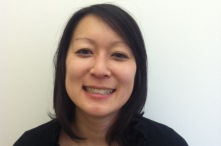Making an Impact Together
 Noelle Ito is being honored as a Champion of Change for her time and effort in AmeriCorps.
Noelle Ito is being honored as a Champion of Change for her time and effort in AmeriCorps.
Growing up in the Japanese American community in Los Angeles, I always remember spending weekends helping at summer festivals and events. Volunteering in the community was something that was highly valued in my family not as something we talked about but just something my grandparents and parents modeled.
It wasn’t until I attended George Washington University and through my service with AmeriCorps National Youth Project in Washington DC that I learned that I could in fact have a career working in the community. I spent a year with New Community After School and Advocacy Program working with youth of all ages and always thought I’d become a teacher or a social worker but it was during that year that I realized that as much as I enjoyed working with youth on a daily basis, I had a very difficult time thinking about where they would be in just 5 or 10 years. Would my time spent with them have any long-term impact? Would they remember some of the life skills I had attempted to teach? I made the realization that maybe I wasn’t cut out for direct services. The more I became exposed to nonprofits, I realized that not everyone has to be on the frontlines and that instead I could work behind the scenes raising money to provide services.
After leaving DC I put my efforts towards special events and fundraising for Asians for Miracle Marrow Matches, National Multiple Sclerosis Society, Little Tokyo Service Center and BronxWorks along with many volunteer projects.
Last year I took on a different kind of fund development role with Asian Americans/Pacific Islanders in Philanthropy (AAPIP). It was a concept that deeply intrigued me as a way to get a new generation of donors involved in democratic philanthropy where WE decide where our dollars go. GIVING CIRCLES! Just think, what if each group of friends, book clubs, soccer teams, etc. pooled small donations together and collectively decided on an organization or cause to donate to. Individually our donations may not seem large enough to make change or even worthwhile but collectively we can make a greater impact. By empowering communities that may not see themselves as donors, we begin to shift the paradigm, especially for communities of color. To receive a donation from within your community can be extremely empowering.
AAPIP has launched a 5-year giving circle campaign to grow 50 giving circles across the nation as a way to build democratic philanthropy. By investing in the issues that matter most to us, building leaders and lifting our voices in social and policy debates, we are powering the change and the future we want to see for our community.
Noelle Ito is the Director of Community Philanthropy at Asian Americans/Pacific Islanders in Philanthropy (AAPIP), a national membership and philanthropic advocacy organization dedicated to advancing philanthropy and Asian American Pacific Islander (AAPI) communities.
White House Blogs
- The White House Blog
- Middle Class Task Force
- Council of Economic Advisers
- Council on Environmental Quality
- Council on Women and Girls
- Office of Intergovernmental Affairs
- Office of Management and Budget
- Office of Public Engagement
- Office of Science & Tech Policy
- Office of Urban Affairs
- Open Government
- Faith and Neighborhood Partnerships
- Social Innovation and Civic Participation
- US Trade Representative
- Office National Drug Control Policy
categories
- AIDS Policy
- Alaska
- Blueprint for an America Built to Last
- Budget
- Civil Rights
- Defense
- Disabilities
- Economy
- Education
- Energy and Environment
- Equal Pay
- Ethics
- Faith Based
- Fiscal Responsibility
- Foreign Policy
- Grab Bag
- Health Care
- Homeland Security
- Immigration
- Innovation Fellows
- Inside the White House
- Middle Class Security
- Open Government
- Poverty
- Rural
- Seniors and Social Security
- Service
- Social Innovation
- State of the Union
- Taxes
- Technology
- Urban Policy
- Veterans
- Violence Prevention
- White House Internships
- Women
- Working Families
- Additional Issues

